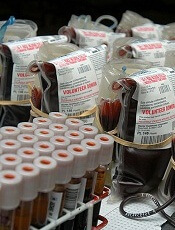
Credit: Daniel Gay
A committee that advises the US Department of Health and Human Services (HHS) has recommended changing the policy that prevents men who have sex with men (MSM) from donating blood.
The Advisory Committee on Blood and Tissue Safety and Availability decided MSM should be allowed to donate blood if they have abstained from sex for a year.
A group of advisers to the US Food and Drug Administration (FDA) will consider this recommendation in a meeting on December 2.
The HHS advisory committee plans to meet on December 5 to discuss establishing a donor transfusion-transmissible infection-monitoring system. The HHS has said such a system should be put in place before lifting the lifetime ban on MSM blood donation.
Should the FDA decide to change its policy, the US would follow other countries that have lifted the lifetime ban in recent years.
For instance, MSM in the UK and Australia are now allowed to donate blood if they have been celibate for a year, MSM in Canada must be celibate for 5 years, and MSM in South Africa can donate if they have been celibate or in a monogamous relationship for 6 months.
The safety of the blood supply
Lifting the lifetime ban on MSM blood donors may raise concerns about the safety of the blood supply, with transfusion recipients worrying they will have a greater risk of contracting HIV.
Although donated blood is tested for HIV, there is an 11-day window in which current tests cannot detect the virus in people who just contracted it. And MSM are more severely affected by HIV than any other group in the US, according to the Centers for Disease Control and Prevention.
Of course, deferring MSM donation for a year would allow enough time for HIV to be strong enough for tests to detect the virus. However, that assumes that donors are telling the truth about their sexual practices.
A study of more than 1000 MSM in Britain showed that 11% had donated blood after having penetrative sex with a man, and 3% had done so in the past 12 months, despite the lifetime ban on MSM blood donation. The study was conducted before the UK lifted the ban.
Still, study investigators said the results supported lifting the lifetime ban on MSM because men who did not comply with the ban generally said they would comply with a 1-year deferral period.
The AABB, America’s Blood Centers, and the American Red Cross have said they support a 1-year deferral period for MSM who want to donate blood in the US.
“This change in policy would align the donor deferral period for MSM with criteria for other activities that may pose a similar risk of transfusion-transmissible infections,” the groups said.
“We believe the current FDA indefinite blood donation deferral for a man who has sex with another man since 1977 is medically and scientifically unwarranted. The blood banking community strongly supports the use of rational, scientifically based deferral periods that are applied fairly and consistently among blood donors who engage in similar-risk activities.”
A report by the Williams Institute suggested that, if the FDA were to lift the ban on MSM completely, an additional 360,600 men could donate 615,300 additional pints of blood each year.
On the other hand, an HHS report suggested that the US supply of blood units is already surpassing demand. The report showed that 15.7 million units of whole blood and red blood cells were collected in 2011, and the total number of units transfused was 13.8 million.

